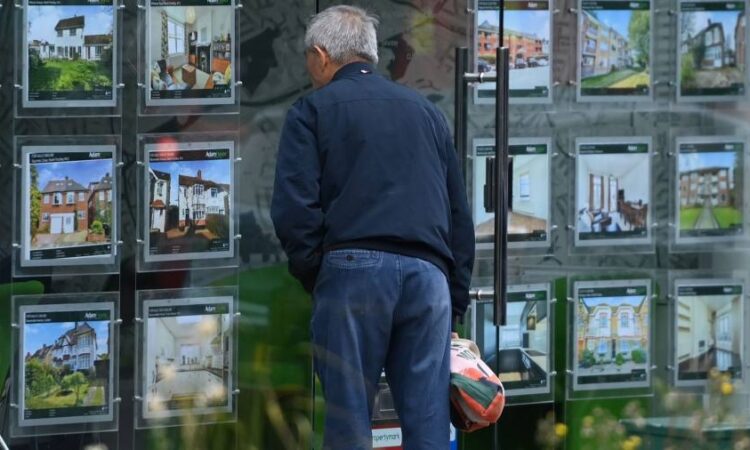
The cost of a two-year fixed-rate mortgage in the UK rose above 6 per cent on Monday, piling pressure on homeowners and Rishi Sunak’s government.
In an indication that mortgage rates could rise even further, two-year gilt yields rose 0.14 percentage points, breaking through the 5 per cent barrier to their highest level since 2008.
Despite the growing political risks, the prime minister rejected providing extra help to struggling households, arguing that his plan to halve inflation was “the best and most important way that we can keep costs and interest rates down for people”. Ministers are instead telling lenders to “live up to their responsibilities” and help the vulnerable.
Mortgage costs have been rising sharply over the past week, ahead of an expected increase in interest rates from the Bank of England on Thursday.
Simon Gammon, managing partner at mortgage broker Knight Frank Finance, said: “Rates at this level are going to come as a shock to the 1.4mn or so households that face remortgaging this year.”
The turbulence continued on Monday, as Barclays, TSB, Metro Bank and Nationwide’s buy-to-let arm were among lenders to pull deals or announce price changes on their fixed-rate mortgages.
According to data provider Moneyfacts, the average cost of a two-year fixed-rate deal rose from 5.98 per cent on Friday to 6.01 per cent on Monday. The cost of a five-year deal went up from 5.62 per cent to 5.67 per cent.
The rise in mortgage costs will hit households ahead of next year’s election, but Sunak and his chancellor Jeremy Hunt argue that giving extra fiscal support to householders would fuel inflation and drive interest rates even higher.
One Treasury official said Hunt had told banks to support borrowers who were “finding it tough right now”.
The interest rate rises pose a mounting challenge to Sunak’s government, which is already confronting a cost of living crisis and is lagging in the polls.
To date, Sunak’s pledge to halve inflation from double-digit rates at the end of last year has been confounded by continued price rises, with inflation at 8.7 per cent for April. The BoE has acknowledged its economic model has failed to predict inflation’s persistence.
In recent weeks, swaps markets have revised upwards estimates for the rate at which they expect BoE benchmark interest rates to peak. They now expect a peak of 5.86 per cent early next year. That is about 1 percentage point higher than had been expected when the BoE last met on May 11.
Swap rates feed into lenders’ decisions on mortgages since they guide their pricing of fixed-rate deals.
Monday marked the first time the average cost of a two-year mortgage breached 6 per cent since the market turmoil of last Autumn, triggered by former prime minister Liz Truss’s “mini” Budget.
Someone with a £200,000 repayment mortgage over 25 years who secured an average two-year fix today would be paying £315 more a month than a borrower fixing at the beginning of June 2022, when the average rate was 3.25 per cent, Moneyfacts said. Over the two-year deal, the difference amounts to £7,564.
Rates on buy-to-let mortgages rose even faster than those on residential deals, with the average two-year fixed rate jumping from 6.21 per cent on Friday to 6.3 per cent on Monday, Moneyfacts said.
Landlords with mortgages are more sensitive to rate rises since they generally take out interest-only loans. This means their monthly payments rise more sharply when interest rates increase.
Additional reporting by Oliver Ralph






